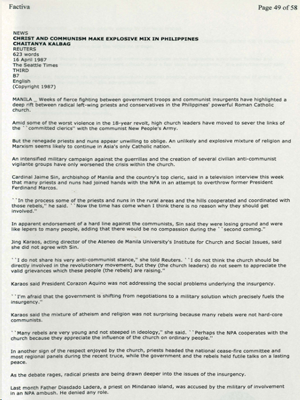CHRIST AND COMMUNISM MAKE EXPLOSIVE MIX IN PHILIPPINES
[Reuters]
Published date: 16th Apr 1987
REUTERS
16 April 1987
The Seattle times
Third
B7
(Copyright 1987)
MANILA _ Weeks of fierce fighting between government troops and communist insurgents have highlighted a deep rift between radical left-wing priests and conservatives in the Philippines’ powerful Roman Catholic church.
Amid some of the worst violence in the 18-year revolt, high church leaders have moved to sever the links of the ” committed clerics” with the communist New People‘s Army.
But the renegade priests and nuns appear unwilling to oblige. An unlikely and explosive mixture of religion and Marxism seems likely to continue in Asia’s only Catholic nation.
An intensified military campaign against the guerrillas and the creation of several civilian anti-communist vigilante groups have only worsened the crisis within the church.
Cardinal Jaime Sin, archbishop of Manila and the country’s top cleric, said in a television interview this week that many priests and nuns had joined hands with the NPA in an attempt to overthrow former President Ferdinand Marcos.
‘‘In the process some of the priests and nuns in the rural areas and the hills cooperated and coordinated with those rebels,” he said. ” Now the time has come when I think there is no reason why they should get involved.”
In apparent endorsement of a hard line against the communists, Sin said they were losing ground and were like lepers to many people, adding that there would be no compassion during the ” second coming.“
Jing Karaos, acting director of the Ateneo de Manila University’s Institute for Church and Social Issues, said she did not agree with Sin.
‘‘I do not share his very anti-communist stance,” she told Reuters. ‘ ‘I do not think the church should be directly involved in the revolutionary movement, but they (the church leaders) do not seem to appreciate the valid grievances which these people (the rebels) are raising.”
Karaos said President Corazon Aquino was not addressing the social problems underlying the insurgency.
‘‘I’m afraid that the government is shifting from negotiations to a military solution which precisely fuels the insurgency.”
Karaos said the mixture of atheism and religion was not surprising because many rebels were not hard-core communists.
” Many rebels are very young and not steeped in ideology,” she said. ” Perhaps the NPA cooperates with the church because they appreciate the influence of the church on ordinary people.”
In another sign of the respect enjoyed by the church, priests headed the national cease-fire committee and most regional panels during the recent truce, while the government and the rebels held futile talks on a lasting peace.
As the debate rages, radical priests are being drawn deeper into the issues of the insurgency.
Last month Father Diasdado Ladera, a priest on Mindanao island, was accused by the military of involvement in an NPA ambush. He denied any role.
Last week another priest, Father Ruperto Palma, said 35 of his fellow priests on Negros island were involve with the communists_ a charge angrily denied by the local bishop.
Two days ago a radical church group on Mindanao, Christians for National Liberation, placed ads in newspapers condemning the military drive and the vigilante groups.
‘‘In the guise of ‘People Power,’ rabid anti-communist civilian armed vigilantes have been formed and organized by the military, local government officials, and a few local businessmen,” the advertisement said.
”Cardinal Sin, forgetting his heretofore nonviolent political position, openly endorses the use of arms and violence against the insurgents,” the advertisement said.
It said it deplored ” the unholy alliance of the reactionary church leadership with the U.S.-Aquino regime.”
Political analysts predicted a growing involvement of priests and nuns with “the rebels, based on the past record of radicalism within the church.
PHOTO; Caption: CHH






